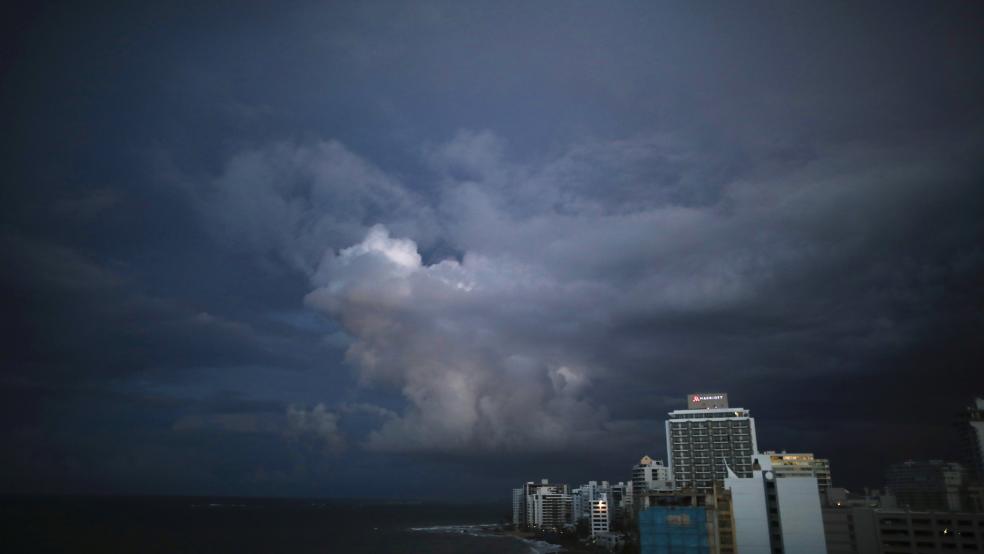Most observers trace Puerto Rico’s financial crisis to a long economic recession on the island, a downturn that is often blamed on Congress’ decision to phase out the tax exemption on Puerto Rican corporate earnings between 1996 and 2006. A deeper look at the numbers suggests that something else is happening — and that an out-of-the-box policy change could turn around the island’s economy. Rather than ask the federal government for statehood, Puerto Rico’s government should instead request the option to issue territorial work visas.
Government statistics show that Puerto Rico’s GDP has fallen about 5 percent over the last 10 years. But per capita GDP has remained flat. So the mega-recession is attributable to population loss. After peaking at 3.83 million in 2004, the island’s population fell to 3.41 million last year. The loss is concentrated among young people and families. The proportion of Puerto Ricans over 65 has risen from 12 percent in 2004 to 14.5 percent last year.
Related: Puerto Rico Votes in Favor of US Statehood Amid Low Turnout
Puerto Rico’s insolvency is not the first municipal bond default triggered by population issues. Detroit went bankrupt after a catastrophic fall in population over a period of decades. Long forgotten is the wave of Florida municipal bond defaults that occurred in the late 1920s and 1930s. In the early 1920s, civic leaders borrowed in anticipation of mass migration to the state. But after a hurricane and fruit fly epidemic, people stopped coming and cities couldn’t shoulder the debts they had taken on.
Puerto Rico’s population decline is attributable to falling birth rates and out-migration. Some people have left the island due to corporate downsizing, but many more are leaving to pursue better opportunities on the mainland. Census figures show that Puerto Rico has suffered net out-migration of 360,000 since 2010. Since Puerto Ricans are U.S. citizens, there is no restriction on them moving to the 50 states.
While earlier generations of Puerto Ricans migrated to poor neighborhoods in New York, Philadelphia and Chicago, Florida is now the favored destination. Orlando is just a three-hour flight from San Juan and the weather is similar. With over 300,000 Puerto Ricans in the Orlando area and more than a million across the state, new arrivals from the Commonwealth are likely to be in the company of friends and relatives. They can also find familiar cuisine and other cultural amenities. Meanwhile, median household income in Florida is more than double that in Puerto Rico and jobs are more readily available.
Related: As Puerto Rico Votes on Statehood, Economic Distress Looms Large
Puerto Rico migration appears to be part of a larger trend that is also adversely affecting middle America. Just as young people are moving from small towns to big cities like New York, Los Angeles and San Francisco, many young, ambitious Puerto Ricans are trying to establish themselves and build their careers in Florida’s more cosmopolitan cities. This is a megatrend that probably can’t be changed by adjusting tax and regulatory policies on the island.
The best guess right now is that Puerto Rico out-migration will continue. As health care and government services deteriorate, the rate of departures could even accelerate. Given the differential in living standards between Puerto Rico and the mainland, it is hard to imagine large numbers of Puerto Ricans moving back to the island — at least not until they retire.
While life in Puerto Rico may no longer be attractive to many Puerto Ricans, it remains a great option for those living in impoverished Caribbean and Latin American countries. Border patrol agents periodically detain migrants attempting to illegally reach Puerto Rico by boat, mostly from Cuba and the Dominican Republic.
Rather than deter immigrants, Puerto Rico should be welcoming them — at least those willing and able to work. With the mainland U.S. closing its doors under President Trump, many immigrants would likely consider work permits valid only in Puerto Rico. This option should be welcome in impoverished and crime-ridden Latin American countries such as Honduras, Guatemala and El Salvador.
Related: Puerto Rico vs Detroit: What's Different?
It would be especially attractive to Venezuelans now facing an economy in freefall. Many Venezuelans have already moved to neighboring Colombia, both legally and illegally. Peru has received over 5,000 emergency visa applications from Venezuelans after establishing a new program in February.
Puerto Rico can compete for these immigrants, and anyone relying on cashflows from Puerto Rico’s government should welcome their presence and the tax revenues they would generate. The federal government should grant Puerto Rico and other U.S. territories the right to grant work visas. These documents would only be valid in the territories issuing them; any visa holder travelling to the 50 states would be treated like any other prospective immigrant from his or her home nation.
Since the territories are separated from the U.S. mainland by long distances and large bodies of water, visa holders would not be able to stream into the 50 states. Their documents could be checked at each territorial airport to prevent them from slipping in via a domestic flight.
One argument made against immigration to the U.S. is that most immigrants don’t speak English as a first language and may not assimilate, thereby diluting American culture. This isn’t a problem with Latin Americans moving to Puerto Rico, whose official language is Spanish.
Related: Why Puerto Rico’s Debt Crisis Could Get Even Worse
Puerto Rico’s governing party may have a concern about this idea: Since the New Progressive Party is pro-statehood, officials may have reservations about federal policies that further distinguish the Commonwealth from states. Perhaps a provision could be added to any federal legislation sun-setting the visa program if and when Puerto Rico is admitted to the Union.
But whatever Puerto Rico’s governing party wants and regardless of the results of Sunday’s low-turnout plebiscite, obtaining statehood is going to be a very long, uphill battle. Since Puerto Rico would likely add two Democratic Senators, it is hard to imagine a Republican Congress voting to admit the island. It also seems unlikely that any Congress would want to take on a state with such poor credit: Since no state has defaulted in the last 80 years, granting Puerto Rico statehood would damage the now pristine reputation of U.S. state bonds. Canada did not admit the formerly insolvent British Colony of Newfoundland as a province until its balance sheet was completely cleaned up.
Puerto Rico is shrinking and fine-tuning its economic policies won’t change that. A new wave of immigrants could rejuvenate Puerto Rico’s economy and contribute new tax revenues that will allow the Commonwealth government to meet more of its obligations.






